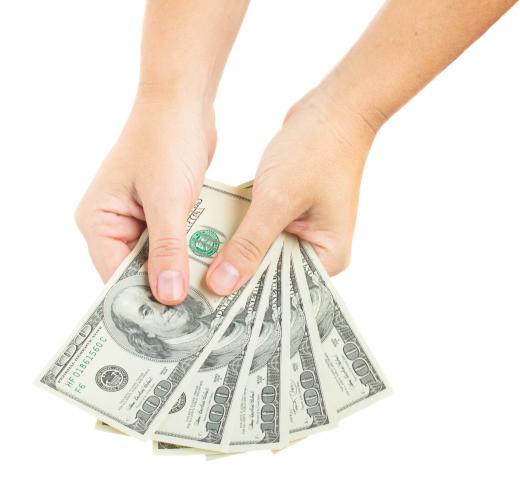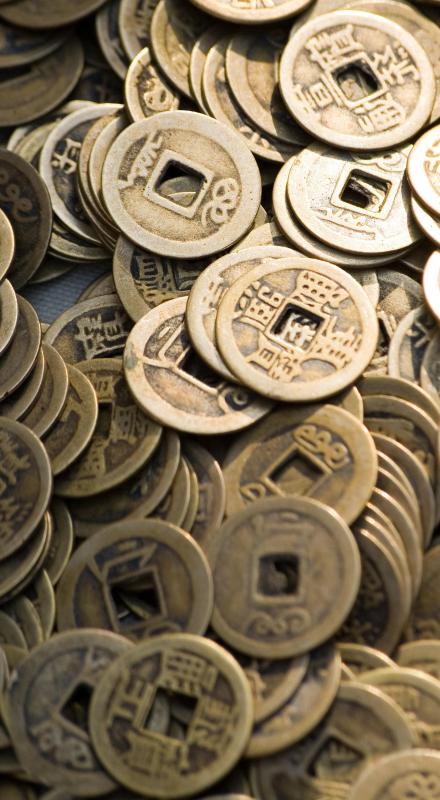At SmartCapitalMind, we're committed to delivering accurate, trustworthy information. Our expert-authored content is rigorously fact-checked and sourced from credible authorities. Discover how we uphold the highest standards in providing you with reliable knowledge.
What is the Best Way to Cash in Coins?
In many homes, residents have a stash of coins that has accumulated over the years, whether the coins are stored in a mason jar, a ceramic jug, or a piggy bank. Some people find themselves becoming amateur coin collectors because they don't know how to cash in coins, but several options do exist. In most countries, financial institutions will redeem coin for cash, but there are often policies regarding whom can exchange coin and what fees, if any, may apply for such a transaction. Coin-sorting machines are commonly found in financial institutions, supermarkets, and some restaurants or cafés; these machines count and sort the coin that is poured in, then print a receipt showing the totaled amount, which can be exchanged for cash. It is also possible to purchase a coin machine that will sort coins, making it easier for a person to count and store coins in bank rolls to be traded for bills.
Financial Institutions

Perhaps the most common place people think of to cash in coins is a financial institution such as a bank or credit union. While such places usually do exchange coin for cash, a number of them have strict policies on coin cashing. Some institutions only allow account holders to cash in coins, or they may also require that coins are stored in paper coin rolls of specified dollar amounts; for example, quarters are often wrapped in rolls of $10 US Dollars (USD). Often, these same institutions will mark all approved coin wrappers with the customer's name and account number, to be used as a reference should the coin roll contain more or less than the amount stated on the wrapper. This coin exchange service is usually offered as a free service by most financial institutions, though some do charge a small fee depending on the amount of coin being exchanged.
Coin-sorting Machines

Some financial institutions, supermarkets, and cafés now have coin-sorting machines in their lobbies that allow customers and non-customers alike to cash in coins. These facility-sponsored machines are gaining popularity, with the most locations in the United States and England, but as their popularity grows, additional machines may be introduced worldwide. These machines are calibrated to accept a large supply of unsorted coins placed in a hopper; the coins are separated mechanically and pass under sensors that detect defective, foreign, or counterfeit coins — these coins are automatically sent to a reject bin. The remaining coins are counted and tallied, after which customers receive a ticket redeemable for cash from the facility. Depending on the machine, there may be a service fee, usually between eight and ten percent of the total, charged to the customer for using the coin-sorter.
Personal Coin-sorters

For those who wish to cash in coins from the comfort of home, there are several gadgets available to make the job easier. Electric coin sorters use mechanical and electronic methods to separate coins into individual denominations; after they are separated, the coins can be placed into paper coin wrappers of certain denominations and exchanged at various financial institutions. These consumer-level coin sorters can often be ordered through specialty gadget stores or on the Internet, and some machines come with paper coin wrappers and plastic coin bags for easier processing. When exchanging coin rolls for cash, it is recommended to include all necessary information required by the institution, which can vary from place to place. The rolls may have to be recounted or rewrapped by bank employees before they can be exchanged, so it may be best to cash in coins when there is not a time restriction.
AS FEATURED ON:
AS FEATURED ON:













Discussion Comments
Great post. Coin counters and sorters are my first option. I really feel this money should go to charity.
I just cashed for free at TD Bank. I told the sweet young cashier I was a TD Ameritrade customer(which I am) and smiled a bit and she said "OK, no problem" and saved me $17. Your mileage may vary on this one depending on the cashier. Go young and cute and you too will be taken care of.
Many casinos will count your coins and return it for cash free of charge.
There are a lot of ways to get cash for coins nowadays. You sell it through the above ways or you can sell it to pawnshops or to some friends who are coin collectors and there are many more ways.
the penny arcades at TD (a.k.a. Commerce) are no longer free per se. if you don't have an account there is a 6 percent processing fee. That's still better than CoinStar, which deducts 8 to 10 percent. The new catch with coinstar is that you can exchange the coins for free if you agree to get an e-card for all of your change to a number of stores (ie. CVS, Starbucks, iTunes).
When I was young I remember using a plastic gadget to sort out coins then sliding the color coded paper tubes in and then mom would take them into the bank and trade them for cash right there. After spending hours doing that not too long ago, I took all my color coded rolls with my name and address on them to the local bank. However, they refused to accept them because I didn’t have an account. Years later, after I had an established account, I attempted to cash in some rolls again; except this time I was told they don’t accept rolled coins at all. So as the article said, I would definitely suggest calling ahead about their coin acceptance policy. It could save you time and money. If they accept rolls that’s great, then you avoid those outrageous fees I pay at CoinStar.
Some of the machines found in grocery stores and the like also include the option of donating the worth of the coins to specific charities. It can be a great way to get rid of that collection of money that you weren't spending anyway.
Post your comments